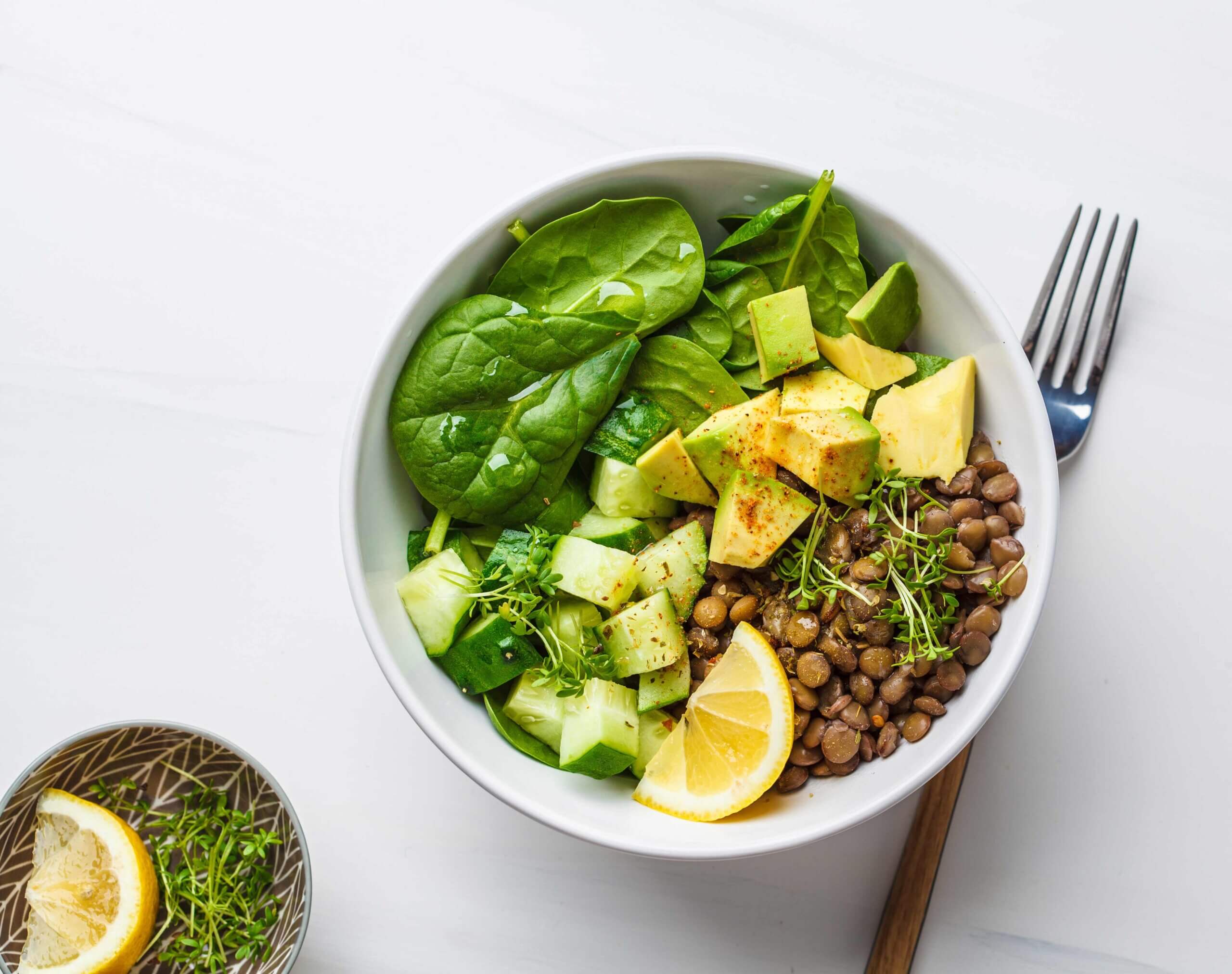Did you know that a small, fascinating world is hidden inside your belly – one that does far more than simply digest your lunch? Our gut is a true marvel of nature and plays a much bigger role in our overall health than many people realise. Whether you’re just starting to explore healthy eating or you’ve been following a plant-based lifestyle for some time, this article takes you on a fascinating journey through the gut – packed with surprising facts, scientific insights and practical tips to support your digestion and boost your wellbeing. So get comfy – we’re about to dive into the world of villi, microbes and silent health heroes working deep inside your body.
Structure and function of the gut
Our gut – also known as the gastrointestinal tract – is a truly remarkable organ. It stretches out to an impressive seven metres in length! But that’s not all. The gut is lined with tiny, finger-like projections called villi. These delicate structures are the key to the gut’s astonishing surface area. If you were to spread it all out, your gut would cover the size of a tennis court! Just imagine that: a tennis court filled with villi working hard to absorb nutrients.
These villi are responsible for absorbing nutrients from the food we eat. They greatly increase the gut’s surface area, allowing the body to absorb vitamins and minerals far more efficiently. Without them, our digestive system wouldn’t be able to extract the essential nutrients we need to thrive.
But there’s more. Our gut also houses an impressive immune system. Around 70% of our immune system is located in the gut, working tirelessly to keep harmful bacteria and pathogens at bay. A healthy gut doesn’t just mean better digestion – it also means stronger immune defences.
The microbiome: your invisible inner army
Have you ever heard of the microbiome? This term refers to the community of around 100 trillion microorganisms – including bacteria, viruses and fungi – that live in our gut. Together, they can weigh up to two kilos. If you lined them up like beads on a string, they would circle the earth two and a half times. These tiny organisms are vital to our health: they aid digestion, support the immune system, produce vitamins and even influence our mood. A healthy microbiome is the key to a healthy gut. [1] [2]



Gut flora vs. gut lining
People often confuse the terms ‘gut flora’ and ‘gut lining’. The gut flora refers to the bacteria and microorganisms in the gut, while the gut lining is the protective layer that lines the intestinal wall. Together, they play an essential role in keeping our digestive system functioning well. Gut flora helps digest food and prevents harmful microbes (like pathogenic bacteria, viruses, parasites and fungal toxins) from taking hold. The gut lining acts as a barrier that prevents harmful substances – including undigested food particles or immune cells localised in the gut – from entering the bloodstream and causing damage such as infections, allergies or autoimmune reactions. [3]
The surprising link between gut and brain
You might be wondering what your gut has to do with your brain. The answer lies in what’s known as the ‘second brain’ or enteric nervous system. Our gut contains millions of nerve cells that communicate with the brain. This gut-brain connection helps explain why our mental state is so closely linked to gut health. A healthy gut can reduce stress and lift your mood. Here’s the fascinating part: the gut contains the same type of nerve cells as the brain – and they’re in constant communication. Interestingly, most of the information flows from the gut to the brain, not the other way around. “You are what you eat” is more than just a saying. [4]
For those who’d like to explore the topic further:
Book recommendation:
The book Gut by Giulia Enders is a wonderful introduction to the fascinating world of the gut. With humour, vivid examples and sound medical knowledge, the author explains why our gut is so much more than a digestive organ – and how closely it’s connected to our immune system, brain and overall wellbeing.
Film recommendation:
The Netflix documentary Hack Your Health: The Secrets of Your Gut takes a light-hearted yet informative look at the vital role gut health plays in our mood, energy levels and general health. Giulia Enders also features in the documentary, helping to explain complex processes around digestion and the microbiome in a clear and engaging way.

Vegan vs. conventional diet: what impact does it have on the gut?
Here’s a question many of you have asked: how does a vegan diet compare to a conventional diet when it comes to gut health? Vegans avoid all animal products, which means their diets are naturally rich in fibre, antioxidants and beneficial plant compounds – all of which promote a diverse microbiome and healthy gut flora.
On the other hand, a conventional diet that includes meat, fish and dairy can strain the gut. It often contains saturated fats and lacks fibre, which may lead to an unhealthy microbiome. An imbalanced gut flora can increase inflammation and raise the risk of chronic diseases.
In a large-scale meta-analysis conducted by the Physicians Committee for Responsible Medicine (PCRM), researchers evaluated 103 studies comparing the effects of vegetarian and vegan diets with meat-based diets on gut flora. Most of these studies were published between 2016 and 2018. The findings were remarkable:
- Diet is the key factor influencing gut flora composition – and therefore, health.
- The more diverse your good gut bacteria, the lower your risk of diseases like osteoarthritis, bowel cancer, cardiovascular disease and obesity.
- The difference between vegetarian and vegan diets is minor – but both show significantly more diverse microbiomes than diets that include meat.
- Switching to a vegan or vegetarian diet improves gut flora within just one week. However, if meat is reintroduced, the effect reverses. Long-term improvements occur after about three months.
- Diets high in animal protein promote inflammation and increase the risk of bowel cancer.
- Plant-based fats (such as oils, nuts and seeds) support the growth of beneficial gut bacteria, while animal fats raise the risk of cardiovascular disease.
- A meat-free diet supports better overall vitamin status. [5]
Discover more impressive health benefits of the vegan diet for your wellbeing.
“
"Wealth is much. Contentment is more. Health is everything!"
Asiatische Weisheit
8 tips for a healthy gut
Now that we’ve covered the basics of gut health, here are some practical tips to keep your gut in top shape:
- Eat more fibre: A high-fibre diet supports the growth of good bacteria in the gut. Fresh fruits, vegetables, whole grains and legumes are excellent sources. They also help your villi work efficiently. Polyphenol-rich foods like herbs and spices aren’t just a treat for your tastebuds – they’re great for your gut too.
- Boost your polyphenols: Polyphenols – a group of secondary plant compounds – are found in dark-coloured, plant-based foods. Herbs and spices are especially rich in them. Cloves lead the way with 15,188 mg of polyphenols per 100 g, followed by dried peppermint with 11,960 mg and star anise with 5,460 mg. So feel free to get creative with your spice rack.
- Eat probiotic foods: Probiotics are live microorganisms that support gut health. Yoghurt, sauerkraut, kefir and other fermented foods are great sources. Try to include them in your daily meals to maintain a healthy microbiome.
- Drink enough water: Water is essential to keep the gut lining hydrated and support digestion. It also helps your villi do their job effectively.
- Manage stress: Stress can negatively affect the gut. Relaxation techniques such as yoga, meditation or mindful walks can help – and they also support the gut-brain connection.
- Cut down on sugar and processed foods: Too much sugar or processed food can disrupt the gut flora. Reducing sugar intake helps maintain a healthy balance in your microbiome.
- Move your body: Physical activity supports blood flow in the gut and boosts overall health. It also helps your villi absorb nutrients more efficiently.
- Be cautious with antibiotics: Antibiotics can severely disrupt your gut flora. Only use them when truly necessary, and be sure to support your gut afterwards.
Your gut-friendly wellness routine:
FRESH pack cleansing contains an impressive 11 g per sachet and is also rich in calcium – helping to get your digestion back on track in a natural way. It supports your microbiome with powerful ingredients like guar gum fibre, acacia fibre, apple fibre and linseed flour – all natural allies for strengthening your gut flora from the inside out. BEYOND biotic takes things one step further by helping beneficial bacteria settle in your gut – promoting long-term gut health. Don’t forget: a fibre-rich diet is essential to nourish these new bacteria and keep them thriving. Give your gut the perfect support it deserves!
If you’re already following a vegan diet – well done! You’re doing your gut and your overall health a huge favour. And if not, maybe now’s the time to explore plant-based options and do something kind for your gut.
Ultimately, gut health plays a crucial role – not just in digestion, but in your overall wellbeing. By focusing on a balanced diet and following the tips above, you can keep your gut in top condition. Just remember: your gut isn’t just another organ – it’s your key to lasting health and vitality.
Disclaimer: This text is not a substitute for professional medical advice, diagnosis or treatment. It must not be used as a basis for self-diagnosis or for starting, changing or discontinuing medical treatment. Always consult a qualified healthcare professional if you have any health concerns or symptoms. Greentrinsic accepts no liability for any discomfort or harm arising from the use of the information provided.
Sources:
1. Müller, C. (2023): Microbiome: The gut and its inhabitants: What they like and what they mean, (https://www.bzfe.de/ernaehrung/ernaehrungswissen/gesundheit/mikrobiom/)
2. German Centers for Health Research (2023): Microbiome: Detailed description, (https://www.dzif.de/de/glossar/mikrobiom)
3. Rehberg, C. (2023): Building up the intestinal flora: The guide and tips, (https://www.zentrum-der-gesundheit.de/bibliothek/koerper/darmflora-uebersicht/darmflora)
4. Fleckenstein, S. (2022): The gut-brain: How does the gut-brain axis work?, (https://fleckenstein-natur.de/ratgeber/darm/bauchhirn/)
5. Tomova, A.; et al (2019): The Effects of Vegetarian and Vegan Diets on Gut Microbiota, (https://www.frontiersin.org/articles/10.3389/fnut.2019.00047/full)




